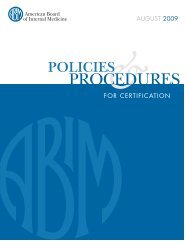The SRA Symposium - College of Medicine
The SRA Symposium - College of Medicine
The SRA Symposium - College of Medicine
You also want an ePaper? Increase the reach of your titles
YUMPU automatically turns print PDFs into web optimized ePapers that Google loves.
meeting, as this has far more impact and provides an excellent opportunity to discuss other possible<br />
funding sources. Always provide the PI with neatly written notes, as this lends weight to the<br />
discussion that cannot be achieved by an informal chat alone (see sample notes, Appendix A).<br />
Do a funding search beforehand and take along a sheaf <strong>of</strong> grant summaries—there is a strong possibility<br />
that among them are one or two potential sponsors the researcher was not aware <strong>of</strong>, and<br />
this can change the tone <strong>of</strong> the whole session. Finally, you can draw upon your broader knowledge<br />
<strong>of</strong> faculty expertise and award history to suggest possible collaborators or mentors, and this is too<br />
is greatly appreciated, especially by younger faculty.<br />
Rule 10: Be prepared to swing into contingency mode<br />
Expect snags to crop up. Consider this scenario: a new limited submission program has slipped<br />
under the radar screen, and never appears on the research <strong>of</strong>fice’s posted list. Shortly before the<br />
sponsor’s deadline, a PI appears in your pre-award <strong>of</strong>fice with a sketchy draft proposal. Being first<br />
in line and with the deadline approaching, she’s given the go ahead. <strong>The</strong> next day, a more polished<br />
proposal comes in, with a second PI anxious to submit. What to do? In this situation, the best<br />
course is to seek shared decision making. Convene a quick meeting <strong>of</strong> the principals (PI’s plus<br />
department heads or deans), and start the discussion by (a) acknowledging the lapse in communications,<br />
and (b) reminding the group that the ultimate purpose <strong>of</strong> the limited submission policy<br />
is to assure the best proposal goes forward while being fair as possible to all participants. <strong>The</strong>n ask<br />
them which proposal they think should be submitted (the documents having been distributed to<br />
all before the meeting). Given that both PI’s were lax in communicating their intent, the tentative<br />
approval given the first PI becomes moot, and you have at least a reasonable chance that the group<br />
will agree to send the better proposal. <strong>The</strong>re are many variations to this scenario, but the point is<br />
to act quickly, and to take responsibility immediately for any shortcoming(s) on the part <strong>of</strong> the<br />
research <strong>of</strong>fice.<br />
Summary<br />
<strong>The</strong> expanding gatekeeper role forced by more limited submission programs provides rich opportunities<br />
for research administration to be seen, not as a reluctant enforcer, but as a conscientious<br />
supporter <strong>of</strong> the university’s—and the faculty’s—best interests. To do this effectively, a positive<br />
management philosophy must be articulated, backed by systematic procedures that assure fairness<br />
and consistent benefit to the principal stakeholders. Above all, constructive feedback to all PI’s can<br />
turn a difficult process into a powerful tool for faculty development.<br />
References<br />
Papers<br />
National Institutes <strong>of</strong> Health, Center for Scientific Review. (2001). Study section member satisfaction<br />
survey final report: Executive summary. Retrieved 15 February 2005 from http://www.csr.<br />
nih.gov/events/ExecSumm.pdf<br />
National Science Foundation. (2004). NSB-04-43: Report to the National Science Board on the National<br />
Science Foundation’s merit review process, Fiscal Year 2003. Retrieved 15 February 2005<br />
from http://www.nsf.gov/nsb/documents/2004/MRreport_2003_final.pdf<br />
2005 <strong>Symposium</strong> Proceedings Book 219

















